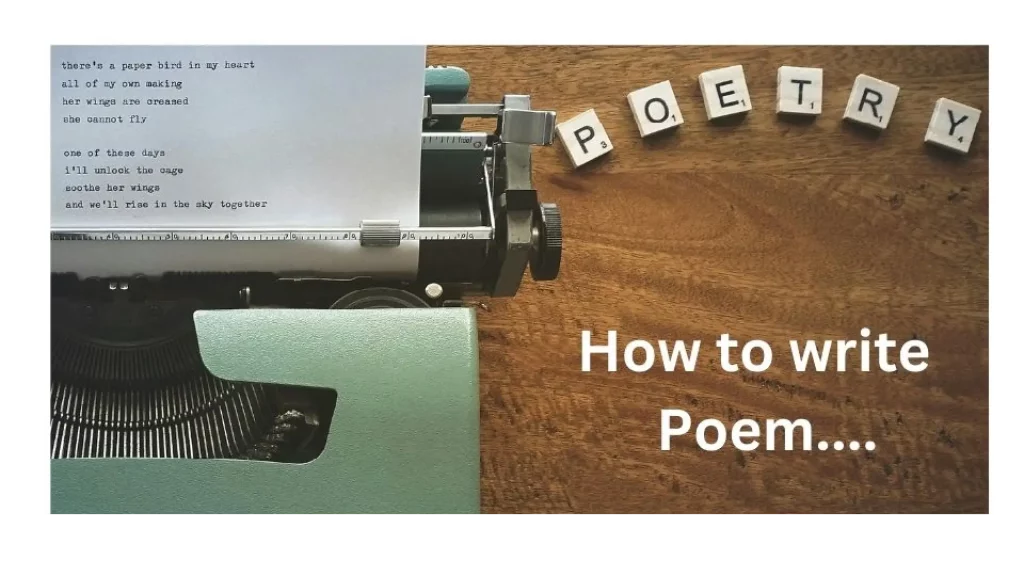Poetry is a literary work, a distinctive way to express feelings, thoughts, and observations in an intensely unique, artistic, and rhythmic way. For thousands of years, poetry has existed in various cultures and societies. It has ignited revolutions and also sowed the seeds of love. “Poets are the unacknowledged legislators of the world” as Percy Bysshe Shelly puts it in “Defence of Poetry.” Writing poetry requires both talent and skill. Also, like any other skill, poetry too can be learned with practice and encouragement. This article will provide you with useful advice on How to write a Poem regardless of your level of experience or desire to explore the world of poetry. We look at the creative process from writing verses on our own to writing poems.
Below are 10 Tips Learn Poetry
Read and listen a lot
Read poetry as a starting point if you wish to Write a Poem. You can accomplish this informally by allowing the lines of your favorite poems to simply wash over you without necessarily looking further for deeper meaning. Poetry consumption need not be an intellectual exercise, it can be melodic—for example when you hear the sharp consonants of a poem read aloud at your first poetry slam. A lot of bookstores and coffee shops host poetry readings which are always entertaining and instructive for aspiring poets.
Find what inspires you.
Knowing what inspires you is an important step towards your goal to Write Poem on your own. It might be a vivid dream, a personal experience, an emotion you would like to share or even a picture that captures your attention. Let your emotions lead you and your thoughts run wild.
Try different Themes
Try experimenting with various themes as a beginner to find what speaks to you. Write poem based on your observations, dreams or experiences. Feel free to use your imagination and don’t feel limited to any one subject.
Express freely – choose your style
Some of the same political and philosophical ideas you might discuss in an essay can also be expressed in a lyric poem such as Emily Dickinson’s “Banish Air from Air.”
The answer to all of the above is yes, but poetry encompasses much more. Poetry is a broad literary category that covers everything from bawdy limericks to unforgettable song lyrics to the sentimental couplets inside greeting cards. Poetry’s lack of rules can make it feel hard to define but is also what makes poetry enjoyable for so many to write.
If you’ve ever wondered how to write a poem, read on. Writing poetry doesn’t have to be daunting—we’re going to demystify the process and walk you through it, one step at a time.
Carefully chosen words can convey an entire philosophy in a limited number of lines as poetry is primarily about precise word choice. Therefore, Big bold ideas can be communicated even in seemingly light poetic forms like silly rhyming limericks or nursery rhymes. You just need to pick the appropriate phrases.
Be Simple – tell a story in a poetic way
Poems frequently deal with difficult subjects and feelings, but simplicity can have just as great an impact. So, don’t feel obligated to employ complex vocabulary or deep metaphors. A direct expression of feeling can occasionally strike a deep chord with readers.
Familiarize with different forms of poetry
There are specific requirements for each type of poetry that set it apart from other forms such as rhyme scheme line count meter and subject matter. Consider these structures as the prose writing equivalent of the grammar rules governing prose. It’s crucial to stay within the parameters of the poetry form you’ve selected whether you’re writing a free verse poem which has no restrictions on length meter or rhyme scheme or a villanelle which is a nineteen-line poem with five tercets and a quatrain and a highly defined internal rhyme scheme. Being versatile is a valuable skill even if you end up writing only one kind of poem in the end.
Use literary devices
Poems benefit from literary devices just like any other type of writing. Introduce literary devices such as metonymy synecdoche metaphor allegory and imagery into your poems to hone your poetic skills. This can be more difficult in poetic forms with strict meter and rhyme schemes such as free verse and relatively easy in non-rhymed forms.
Break the rules
Seldom do people stand out enough to succeed as poets (or in many other areas of the arts and literature) by following the path taken by others. In fact, those who consistently adhere to all of the fundamental guidelines for self-promotion are extremely rare.
Be a rule-breaker throughout your poetic career. Break the rules. Spit against the conventions. Drive yourself crazy. While the majority of these experiments are doomed to failure a select few may help you establish yourself. Obviously the first thing to do is to memorize all of the rules. If not, you won’t know which rules to break and how to do so most effectively.
Use Metaphors and Similes
Instead of just listing adjectives you can use metaphors and similes to conjure images in your writing. Since metaphors directly compare two unlike objects, they can be quite poetic in and of themselves.
A metaphor would be the phrase “Life is an adventure.” But if we were to say, “Life is like an adventure”, we would be comparing two things with the use of similes which are expressed with terms like or as. These are useful tools that can assist in creating parallels and offering ideas for further development in your poetry.
Join writing groups
Poetry readings and sometimes even writing workshops help poets get to know one another. Within the artistic community poets frequently critique each other’s first drafts read aloud from their own poems and discuss each other’s work. Poetry is a versatile art form, and you can come across other forms within a community that are equally creatively stimulating as the poems you usually write. Therefore, look for a poetry group where you can read a variety of poems, have discussions about the form, write down new thoughts and gain insight from the work of your peers.
Conclusion
You only need some inspiration and a pen to start writing poetry which is easier than many of us realize. Above all, never forget to describe things as you see them. As you follow your imagination you can also experiment with various creative writing prompts. Enroll in a poetry course and learn How To Write Poem for Beginners would be a great start.
FAQs
Ans. The thought of identifying as a poet can be daunting regardless of how long you’ve been writing for yourself or how recently you started. However, anyone can advance their writing with the correct guidance and dedication.
Ans. The best response to this query in my opinion is that poets are both born and trained. To be clear I do not think that anyone can fully teach the art and craft of poetry, nor do I think that anyone is born with a quill pen promise for the future.
Ans. Seek inspiration from your past encounters, feelings outdoors or even visuals. Examine your emotions.
Ans. Writing is definitely a skill. Learning to write can take a lifetime. Your professional and academic growth will greatly benefit from hard work.
Ans. In your poetry try to include your own recollections insights or firsthand experiences. Your poetry will gain a burst of authenticity and specificity if it begins with an element that is intimate and specific to your own life.



